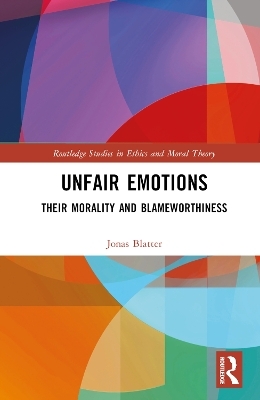
Unfair Emotions
Their Morality and Blameworthiness
Seiten
2025
Routledge (Verlag)
978-1-032-80674-7 (ISBN)
Routledge (Verlag)
978-1-032-80674-7 (ISBN)
- Noch nicht erschienen (ca. März 2025)
- Versandkostenfrei
- Auch auf Rechnung
- Artikel merken
This book provides a novel philosophical account of the unfairness of certain emotions. It explains how the concept of unfairness can be applied to emotions and how emotions can be the proper objects of second-person moral evaluation.
Emotions are an integral part of our moral practices. While the links between emotions and morality have received much philosophical attention recently, the phenomenon of unfair emotions remains under-explored. This book examines an everyday phenomenon: that we often perceive other people’s emotions as unfair, in a similar way as if they acted unfairly. It argues that the notion of unfairness combines elements of the unfittingness and of the moral relevance of an emotion. In the first half of the book, the author shows how an unfair emotion can wrong another person. His account holds that an emotion is unfair to its target if its inherent action tendencies constitute a directed moral hazard to the targeted person. In the second half, the author examines to what extent we are responsible for feeling an unfair emotion, and in what way we can—and cannot—be held accountable for it. He argues not only that emotions can be unfair, but also that there are limits to when we may hold people accountable for them.
Unfair Emotions will appeal to scholars and graduate students working in ethics, philosophy of emotion, moral psychology, and cognitive psychology.
Emotions are an integral part of our moral practices. While the links between emotions and morality have received much philosophical attention recently, the phenomenon of unfair emotions remains under-explored. This book examines an everyday phenomenon: that we often perceive other people’s emotions as unfair, in a similar way as if they acted unfairly. It argues that the notion of unfairness combines elements of the unfittingness and of the moral relevance of an emotion. In the first half of the book, the author shows how an unfair emotion can wrong another person. His account holds that an emotion is unfair to its target if its inherent action tendencies constitute a directed moral hazard to the targeted person. In the second half, the author examines to what extent we are responsible for feeling an unfair emotion, and in what way we can—and cannot—be held accountable for it. He argues not only that emotions can be unfair, but also that there are limits to when we may hold people accountable for them.
Unfair Emotions will appeal to scholars and graduate students working in ethics, philosophy of emotion, moral psychology, and cognitive psychology.
Jonas Blatter is a philosopher working on the intersection between ethics and philosophy of emotion, with a focus on moral responsibility and interpersonal norms. After his PhD at the University of Bern, he became a Postdoc researcher at Ruhr University Bochum, expanding his research to include interactions with emotive AI.
1. Introduction 2. Criticism of Emotions 3. Unfair Emotions 4. Responsibility and Control 5. Accountability for Emotions 6. Fair Resentment for Unfair Emotions 7. Conclusion
| Erscheint lt. Verlag | 4.3.2025 |
|---|---|
| Reihe/Serie | Routledge Studies in Ethics and Moral Theory |
| Zusatzinfo | 2 Line drawings, black and white; 2 Illustrations, black and white |
| Verlagsort | London |
| Sprache | englisch |
| Maße | 152 x 229 mm |
| Themenwelt | Geisteswissenschaften ► Philosophie ► Ethik |
| Geisteswissenschaften ► Psychologie | |
| ISBN-10 | 1-032-80674-5 / 1032806745 |
| ISBN-13 | 978-1-032-80674-7 / 9781032806747 |
| Zustand | Neuware |
| Haben Sie eine Frage zum Produkt? |
Mehr entdecken
aus dem Bereich
aus dem Bereich


